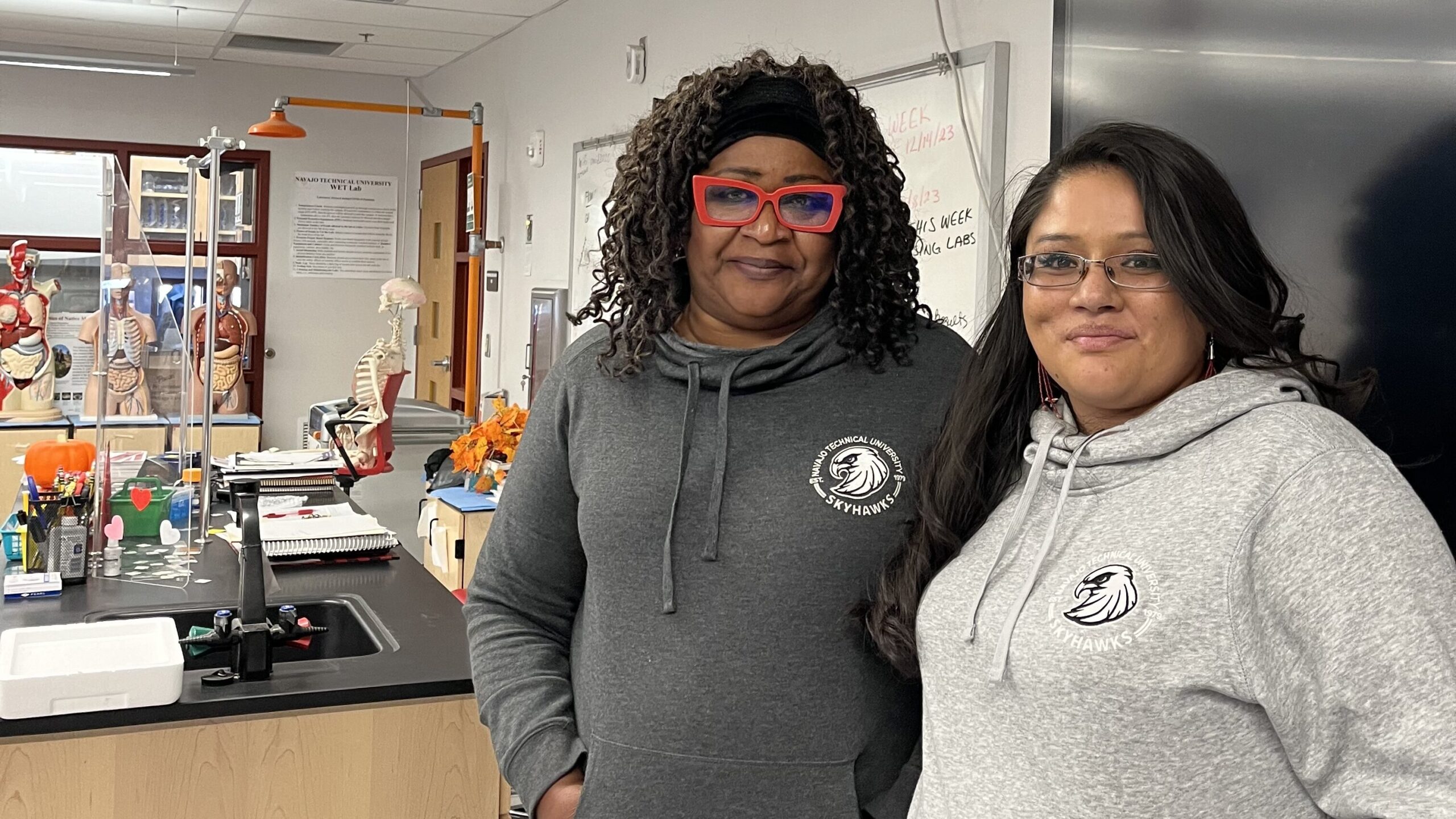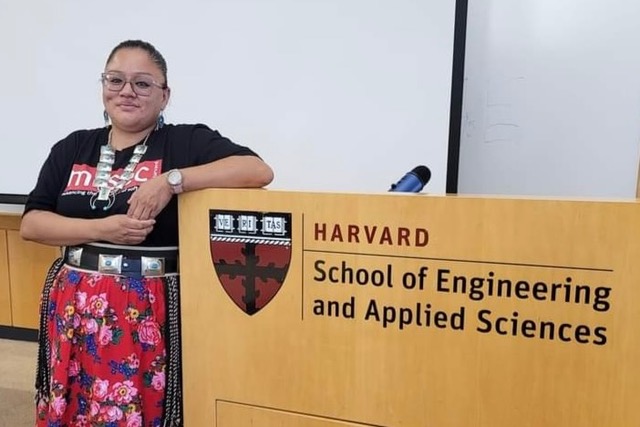From running a Covid testing center to mentoring students analyzing the healing properties of traditional medicines, Dr. Irene A. Anyangwe, professor of biology and microbiology at Navajo Technical University, is finding ways to address the most pressing needs of the Navajo Nation.
By Wafa Hozien

In the heart of the Navajo Nation, Dr. Irene A. Anyangwe, has spent six remarkable years at Navajo Technical University (NTU) making extraordinary contributions to the fields of biology and microbiology. Her tenure at NTU has been marked by groundbreaking research, transformative community initiatives, and an unwavering commitment to her students. One of the most striking aspects of Dr. Irene’s work is her profound respect for traditional Indigenous knowledge, a value she has seamlessly woven into her scientific endeavors.
During the challenging days of the Covid-19 pandemic, Anyangwe, who is known as Dr. Irene to her students, played a pivotal role by developing COVID tests that were distributed to the Navajo Nation when tests were scarce. Recognizing the urgent need for accessible testing, Anyangwe and her team designed a more straightforward method for sample collection and real-time PCR analysis. Not only did they provide these tests, but they also offered their expertise, training students and healthcare providers. Laboratory equipment was also donated to the overwhelmed local hospital, which was in dire need of additional resources.
Traditional Knowledge Meets Modern Science
Originally from Cameroon, where she is a member of the “Bantu” tribe, Anyangwe completed her education in the United States and served as a Fulbright Fellow from 2012-13 at the National Institutes of Health. Although she moved to the Navajo Nation unfamiliar with the community and was initially surprised by the isolation, she eagerly takes part in cultural activities and actively incorporates traditional tribal knowledge into her scientific research and educational approach.
“I do not know everything,” she emphasized. “I bring medicine men and elders to my classes; I respect the culture; what I do not understand, I bring the Navajo people to explain.”
In one instance, NTU student Chelsie Whitewater analyzed traditional medicinal plants, including Navajo tea, sage, juniper, cliffrose, and yucca fruit, to understand their inhibitory effects on E. coli and staphylococcus bacteria. This project seamlessly integrated the medicinal knowledge deeply rooted in the Navajo culture with modern scientific investigation. The results showcased the potential of traditional remedies in combating bacterial infections. Anyangwe clarifies, “our work with traditional knowledge and modern science is a testament to the harmony that can be achieved when we respect each other’s worlds and bridge the gaps with understanding.”
Anyangwe’s commitment to advancing science and education goes hand in hand with her dedication to student success. Collaborations with prestigious institutions such as Harvard University have created unique opportunities for NTU students. The NTU-Harvard partnership has seen NTU students working at the Ivy League university’s Weitz Lab, where they developed a microfluidic sorting device and an emulsion technique for clinical diagnostics, among other activities. These endeavors have not only equipped students with valuable skills but also opened doors for their future pursuits, including continued study at prestigious medical and bioengineering programs.

One beneficiary of these partnerships is Kyra L. Capitan, a senior completing her BS degree in biology. Under Dr. Irene’s guidance, Kyra had the rare privilege of completing two summer internships at Harvard University. The opportunity to immerse herself in the world of renowned scientific researchers was a transformative experience, Capitan said. The experience not only exposed her to cutting-edge research but also allowed her to interact with some of the brightest minds in the scientific community.
Dr. Irene, in Kyra’s words, is “a wonderful instructor who cares about her students and their future. The work I have done with Dr. Irene has opened so many doors for me as a student.”
A Call to Collaboration and Respect
Anyangwe’s journey at Navajo Technical University has been marked by the continuous pursuit of knowledge. Her students actively participate in research that shapes their future and the future of the Navajo Nation. “My students go into their community to work,” she said, recalling a recent gathering at a chapter houses where they shared information with elders about their studies and research. “They tell the stories to the elderly and transmit what they learned,” she said. In these ways, her students are conduits for knowledge transfer between generations.
One of the significant challenges Anyangwe has faced is ensuring the sustainability of the knowledge pathways she has created for Native American students in STEM. However, this challenge is also one of her greatest successes. The students she has mentored, all twelve of them, aspire to pursue Ph.D. degrees, each carrying forward the torch of research, community engagement, and traditional knowledge integration. These students are not just scholars but also potential leaders in their communities who will champion research directed at addressing the unique needs of their people.
As educators and institutions across the world seek ways to bridge the gap between traditional Indigenous knowledge and modern STEM research, Dr. Irene’s message is clear: learning begins with respect, collaboration, and a deep appreciation for the culture and history of the community you are serving.
Anyangwe’s work at NTU epitomizes the powerful union of science and tradition, showing the world that one does not need to be sacrificed for the other. Rather, it is through their respectful coexistence that the most profound discoveries are made. In the end, this approach is a blueprint for a future where tradition and science walk hand in hand, enlightening the way for the next generation of researchers and strengthening Indigenous communities.
A Vision for the Future
Anyangwe envisions a future where Native American students continue to excel in STEM and assume leadership roles in research that addresses the specific needs of their communities. Her students are not only aspiring to pursue doctoral degrees but also actively applying their research findings within their communities. As one student put it, “It is Dr. Irene’s caring and gently nudging her students towards excellence.”
Anyangwe’s exceptional journey at Navajo Technical University not only aligns with the institution’s commitment to fostering STEM education but also sets a resounding example for educators, institutions, and students across the globe. Her work is a testament to the power of collaboration, respect, and the enduring wisdom that traditional knowledge offers. Anyangwe explained, “science is a bridge that connects the wisdom of tradition with the promise of the future. It’s about respecting culture and opening the doors of knowledge for our students.”
Anyangwe’s work at Navajo Technical University is a testament to the power of dedication, collaboration, and the harmonious coexistence of tradition and science. Her impact reverberates not only within the walls of the university but throughout the Navajo Nation and the broader scientific community. Her approach is an inspiration for educators and institutions seeking to integrate traditional Indigenous knowledge with modern STEM research, ultimately benefiting Indigenous communities and fostering the next generation of Native American scientists.
Wafa Hozien, Ph.D. is a university academic affairs executive. Dr. Hozien can be reached @wafahozien on Twitter and Instagram.
• • •
Enjoyed this story? Enter your email to receive notifications.

I have known Dr. Irene for over 30 years and her quest for scientific knowledge has not diminished. Finding herself in an appreciated institution is set to bring out the best in her.Students tend to love professors who do not only teach but inspired Congratulations to Dr Irene for your service to the scientific community.
In the realm of academia, Dr. Irene A. Anyangwe’s story unfolds as a tapestry woven with dedication, brilliance, and above all, kindness. As I reflect on my Master’s journey under her guidance, her recent feature in the magazine seamlessly continues this extraordinary narrative. Dr. Anyangwe goes beyond being an academic guide; she’s a beacon of support, fostering an environment where excellence is achieved with compassion.
The well-deserved honor for her academic excellence speaks volumes. While her research pushes boundaries, it’s her kindness that truly sets her apart. In academia’s competitive corridors, Dr. Anyangwe has carved a niche for kindness, investing not only in research but also in the growth and well-being of her students. Her open door extends beyond academic queries, embracing moments of doubt, celebration, and personal growth.
As I embark on my Ph.D. journey, I carry with me not just academic rigor, but the enduring kindness instilled by Dr. Anyangwe. She doesn’t merely teach; she inspires. Her accolades aren’t just achievements; they mirror the transformative impact she imparts on those fortunate to be under her guidance.
In the magazine’s spotlight, Dr. Irene A. Anyangwe stands as a symbol of academic excellence and, more importantly, kindness. Her story, etched in academia’s annals, celebrates not only intellectual brilliance but the profound influence one can have through kindness.
Dr. Irene Has inspired and continue to inspire thousands of young scientists and researchers. I am glad to be amongst those who have benefitted a great deal from her mentorship and counsel. Congratulations Dr. Anyangwe Irene for your remarkable service to the community.